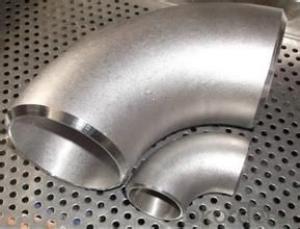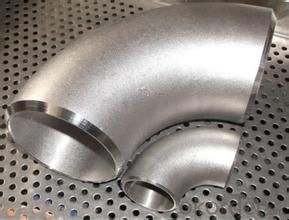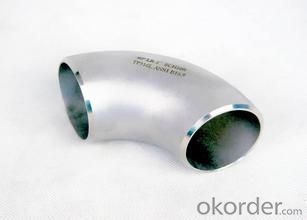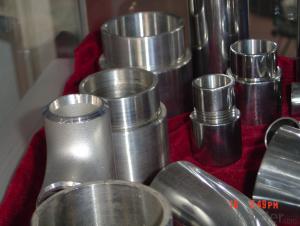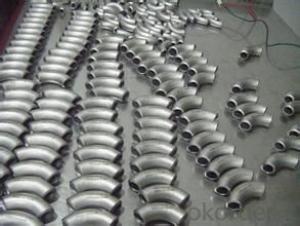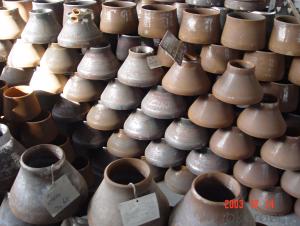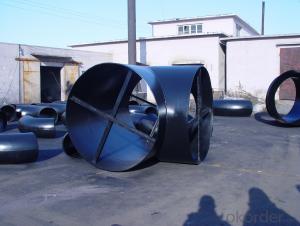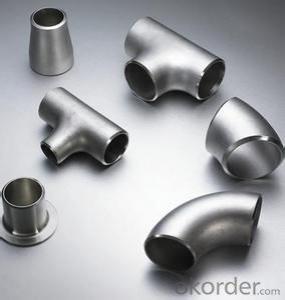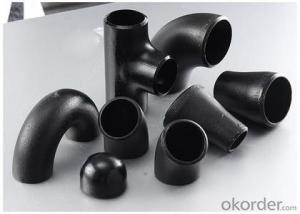STAINLESS STEEL PIPE BUTT WELDED 90D ELBOW LR 304/316 ANSI B16.9 good PRICE BEST QUALITY
- Loading Port:
- Tianjin
- Payment Terms:
- TT OR LC
- Min Order Qty:
- 10 m.t.
- Supply Capability:
- 10000 m.t./month
OKorder Service Pledge
OKorder Financial Service
You Might Also Like
Package Of Stainless Steel Butt-Welded Fitting:
PACKED IN PLYWOOD CASES OR PALLETS
Painting Of Stainless Steel Butt-Welded Fitting:
ANTI-RUST OIL
Marking Of Stainless Steel Butt-Welded Fitting:
REFER TO MARKING DOCUMENT or AS PER CUSTOMER REQUEST
Shipping Marks Of Stainless Steel Butt-Welded Fitting:
EACH WOODEN BOX TWO PLASTIC SHIPPING MARKS
Specification Of Stainless Steel Butt-Welded Fitting:
Stainless Steel 90Deg LR Elbow, Tee, Reducer and Cap
Size : 1/2"-48"
Wall Thickness.: SCH10-SCH160, SGP , XS, XXS, DIN ,STD
| Name | Stainless Steel Butt-Welded Fitting |
| Size | 1/2" - 48" |
| ANGLE | 45D 90 D 180D |
| Wall thickness | Sch5-Sch160 XXS,STD,XS, SGP |
| Standard | ASME B16.9, GOST 17375-2001, DIN2605 and JIS B2311, EN10253-1 etc. |
| We can also produce according to drawing and standards provided by customers. | |
| Material | 304, 304L, 316, 316L, 304/304L, 316/316L, EN1.4301, EN1.4404 etc. |
| Packaging | Wooden Cases, wooden pallet , or carton box , or nylog bag and then in wooden cases |
| Surface Treatment | Anti-rust Oil |
| Delivery Time | 20-30 days, after received advance payment. |
| Quality | 100% Heat Treatment, No Welding repair |
| Others | 1.Special design available according to your drawing. |
| 2.anti-corrosion and high-temperature resistant with black painting | |
| 3. All the production process are made under the ISO9001:2000 strictly. | |
| 4. A conformity rate of ex-factory inspection of products. | |
| 5. we have export right , offering FOB , CNF CIF price |
STANDARD & MATERIAL GRADE
STANDARD Of Carbon Steel Butt-Welded Fitting
| Standard | Wall Thickness | Type | |
| American Standard | ASME B16.9 | S5S ~ XXS | 45D, 90D, 180D ELBOW, TEE, REDUCER, CAP, STUB END |
| ASME B16.11 | |||
| ASME B16.28 | 90D SR ELBOW | ||
| Japanese Standard | JIS B2311 | SGP ~ LG |
MATERIAL Of Stainless Steel Flange
| Stainless Steel | ||
| Material Standard | Material Grade | |
| ASTM | ASTM A182 | F304 / F304 L |
| ASTM A182 | F316/ F316L | |
| ASTM A182 | F310, F321 | |
| ASTM A182 | F321 | |
| DIN EN | DIN EN 10222-5 | EN 1.4301 |
| DIN EN 10222-5 | EN 1.4404 | |
| JIS | JIS G3214 | SUS F304 |
| JIS G3214 | SUS F304L | |
| JIS G3214 | SUS F316 | |
| JIS G3214 | SUS F316L | |
- Q: How are steel pipes used in desalination plants?
- Steel pipes are used in desalination plants for transporting and distributing water throughout the plant's various processes, such as intake, pre-treatment, reverse osmosis, and post-treatment. They are preferred due to their durability, corrosion resistance, and ability to withstand high pressure and temperature conditions. Steel pipes ensure the efficient and reliable conveyance of water, contributing to the overall effectiveness of desalination plants in producing freshwater from seawater.
- Q: What are the different types of steel pipes available?
- In the market, one can find a variety of steel pipes catering to specific needs in different applications. Some commonly used steel pipes include: 1. Carbon Steel Pipes: These pipes, primarily composed of carbon, are the most prevalent type. They are utilized in a wide range of applications such as fluid and gas transportation, structural purposes, and plumbing. 2. Stainless Steel Pipes: These pipes are manufactured using an alloy that contains a substantial amount of chromium, providing excellent resistance to corrosion. Industries like oil and gas, chemical processing, and food processing rely heavily on stainless steel pipes. 3. Alloy Steel Pipes: These pipes, as the name suggests, consist of an alloy containing a combination of various elements like chromium, molybdenum, and nickel. They offer improved strength, durability, and resistance to high temperatures, making them suitable for applications in power plants, refineries, and petrochemical industries. 4. Galvanized Steel Pipes: To safeguard against corrosion, these pipes are coated with a layer of zinc. Due to their exceptional rust resistance and long-lasting durability, galvanized steel pipes find common usage in plumbing systems, water supply lines, and outdoor structures. 5. Seamless Steel Pipes: These pipes are manufactured without any welded seams and are often preferred for applications requiring high pressure, high temperature, or a smooth inner surface. Industries such as oil and gas, automotive, and aerospace frequently utilize seamless steel pipes. 6. Welded Steel Pipes: These pipes are created by welding two steel pieces together. They are available in various shapes and sizes and commonly used in construction, water supply systems, and general engineering applications. 7. ERW (Electric Resistance Welded) Steel Pipes: These pipes are produced by passing a high-frequency electric current through a steel strip and then welding the edges together. ERW steel pipes find wide usage in oil and gas transportation, structural applications, and fencing. 8. LSAW (Longitudinal Submerged Arc Welded) Steel Pipes: These pipes are formed by bending and welding a steel plate into a cylindrical shape. LSAW steel pipes are commonly employed in large-scale infrastructure projects such as oil and gas pipelines and bridge construction. To summarize, the market offers a variety of steel pipes, including carbon steel, stainless steel, alloy steel, galvanized steel, seamless steel, welded steel, ERW steel, and LSAW steel pipes. The choice of steel pipe type depends on specific application requirements, such as resistance to corrosion, strength, temperature, and pressure resistance.
- Q: How do steel pipes compare to other materials like PVC or copper?
- Steel pipes are known for their exceptional strength and durability, making them suitable for various applications. Compared to materials like PVC or copper, steel pipes offer higher resistance to corrosion, fire, and extreme temperatures. They also have a longer lifespan and can withstand high pressure and heavy loads. However, steel pipes are generally more expensive and require regular maintenance to prevent rusting. PVC pipes, on the other hand, are more affordable, lightweight, and easy to install, but they are less durable and have lower temperature resistance. Copper pipes are known for their excellent heat conductivity and resistance to corrosion, but they are more expensive and can be prone to theft. Ultimately, the choice between steel, PVC, or copper pipes depends on the specific requirements of the project and the budget.
- Q: How are steel pipes protected against ultraviolet (UV) radiation?
- Steel pipes are typically protected against ultraviolet (UV) radiation through the application of specialized coatings or paints that act as a barrier, preventing direct exposure of the steel to UV rays. These coatings are designed to withstand UV degradation, prevent corrosion, and extend the lifespan of the pipes.
- Q: Are steel pipes suitable for underground installations?
- Yes, steel pipes are suitable for underground installations. Steel pipes are known for their durability, strength, and resistance to corrosion, making them ideal for underground use. They can withstand the pressure from the surrounding soil and are able to handle heavy loads, making them a reliable choice for underground installations such as drainage systems, water supply lines, and underground utilities.
- Q: How are steel pipes used in the electronics industry?
- Steel pipes are commonly used in the electronics industry for various purposes such as cable management, structural support, and conduit systems. They provide a strong and durable solution for organizing and protecting electrical wires and cables. Additionally, steel pipes are utilized in the construction of electronic equipment enclosures and racks, ensuring stability and efficient cooling.
- Q: Can steel pipes be used for conveying abrasive slurries?
- Yes, steel pipes can be used for conveying abrasive slurries. Steel pipes are known for their durability and strength, making them suitable for handling abrasive materials. Additionally, their smooth interior surface reduces friction and minimizes the risk of clogs or blockages caused by the abrasive particles present in slurries.
- Q: What is the difference between steel pipes and concrete-lined pipes?
- Steel pipes are made entirely of steel and are known for their strength and durability. They are commonly used in various applications, including transporting liquids and gases, as well as structural support. On the other hand, concrete-lined pipes are made of steel with a layer of concrete applied to the inner surface. This concrete lining provides additional protection against corrosion and abrasion, making them suitable for transporting corrosive materials or in aggressive environments. The concrete lining also helps in reducing friction within the pipe, resulting in improved flow efficiency.
- Q: How can seamless steel tubes be produced?
- After extrusion to remove pipe sizing. The sizing machine passes through the cone bit and rotates into the steel embryo at high speed to form a steel tube. The inner diameter of the steel pipe is determined by the outside diameter and length of the sizing machine. When the steel tube is fixed, it enters the cooling tower and is cooled by spraying water. The steel tube is straightened after cooling. After straightening, the steel pipe is sent to the metal flaw detector (or water pressure experiment) by the conveyor belt for internal inspection. If there are cracks in the steel pipe, bubbles and other problems will be detected. Steel pipe quality inspection, but also through strict manual selection. After the quality inspection of the steel pipe, spray with the paint on the number, specifications, production batch number and so on. The crane is hoisted into the warehouse.
- Q: How are steel pipes used in sewage systems?
- Steel pipes are commonly used in sewage systems for their strength, durability, and resistance to corrosion. These pipes are used to transport sewage and wastewater from homes, businesses, and industrial facilities to treatment plants or disposal sites. They are ideal for underground installations due to their ability to withstand high pressure and the weight of the surrounding soil. Additionally, steel pipes can be welded together, providing a seamless and leak-proof system that ensures the safe and efficient transportation of sewage.
Send your message to us
STAINLESS STEEL PIPE BUTT WELDED 90D ELBOW LR 304/316 ANSI B16.9 good PRICE BEST QUALITY
- Loading Port:
- Tianjin
- Payment Terms:
- TT OR LC
- Min Order Qty:
- 10 m.t.
- Supply Capability:
- 10000 m.t./month
OKorder Service Pledge
OKorder Financial Service
Similar products
Hot products
Hot Searches
Related keywords
